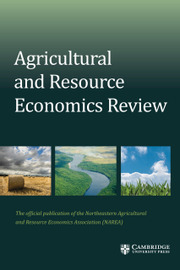Crossref Citations
This article has been cited by the following publications. This list is generated based on data provided by Crossref.
Johansson, Robert C.
2002.
Watershed Nutrient Trading Under Asymmetric Information.
Agricultural and Resource Economics Review,
Vol. 31,
Issue. 2,
p.
221.
Goeschl, Timo
and
Lin, Tun
2004.
Biodiversity Conservation on Private Lands: Information Problems and Regulatory Choices.
SSRN Electronic Journal,
Peterson, Jeffrey M.
and
Boisvert, Richard N.
2004.
Incentive‐Compatible Pollution Control Policies under Asymmetric Information on Both Risk Preferences and Technology.
American Journal of Agricultural Economics,
Vol. 86,
Issue. 2,
p.
291.
Arguedas, Carmen
and
van Soest, Daan P.
2011.
Optimal Conservation Programs, Asymmetric Information and the Role of Fixed Costs.
Environmental and Resource Economics,
Vol. 50,
Issue. 2,
p.
305.

